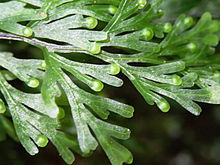| This article needs additional citations for verification. Please help improve this article by adding citations to reliable sources. Unsourced material may be challenged and removed. Find sources: "Hymenophyllum flabellatum" – news · newspapers · books · scholar · JSTOR (March 2018) (Learn how and when to remove this message) |
| Hymenophyllum flabellatum | |
|---|---|

| |
| Hymenophyllum flabellatum | |
| Scientific classification | |
| Kingdom: | Plantae |
| Clade: | Tracheophytes |
| Division: | Polypodiophyta |
| Class: | Polypodiopsida |
| Order: | Hymenophyllales |
| Family: | Hymenophyllaceae |
| Genus: | Hymenophyllum |
| Species: | H. flabellatum |
| Binomial name | |
| Hymenophyllum flabellatum Labill | |
| Synonyms | |
| |
Hymenophyllum flabellatum (Hymen-O-FIL-lum Flab-bel-Lah-tum), the shiny filmy-fern, is a species of fern in the family Hymenophyllaceae. This delicate fern is commonly epiphytic and is between 5 and 25 cm in length. It is distinct, with its thin, one-celled thick, membranous leaves. It is from the family Hymenophyllaceae and is dispersed world wide. The species is dispersed highly throughout Tasmanian rainforests and in the south east of mainland Australia, (Victoria and New South Wales) with small pockets of the population seen in northern Queensland.
The name Hymenophyllum comes from the Greek words hymen (membrane) and phyllon (leaf). Flabellatum comes from Latin flabellatus, meaning "fan-shaped".
Description
The filmy-fern is distinct by its thin, one cell thick, membranous fronds, that grow in moist areas. Fronds are pale yellow green, covered in yellow-brown hairs, and 5–25 cm in length. Linear with entire margins, terminal on short lateral segments, with one singular vein in lateral segment; Sori numerous and present at tips of lateral segments (see image below); indusium two lipped, slightly wider than segment; fronds usually distant and often pendant.
Stomata are absent. Lamina is 2-3 pinnate, ovate to linear, and yellow green; pinnae sometimes with long terminal segments commonly referred to as "tailed", narrowly rhomboidal, to fan-shaped; stipe slender and not winged, with tuft of hairs at base; rachis bearing scattered hairs, winged towards upper parts; receptical short and enclosed.
Habitat and distribution

The shiny filmy-fern is found in rainforests, forming mats on rocks and tree trunks, and even forming curtains in well-lit caves. It is highly dispersed throughout Tasmanian rainforests, and also occurs on Flinders Island, as well as in New South Wales, Victoria and some areas in northern Queensland. The species also highly dispersed throughout New Zealand. Rainforests tend to reside fairly close to coastal areas (due to the need for precipitation) and as a result the shiny filmy-fern tends to not occur inland Tasmania or mainland Australia.

Taxonomy and evolution
The family Hymenophyllaceae is a major and successful family under the division of Pteridophytes (ferns and fern allies). It is known as the filmy fern family and is successful, with about 670-700 species named, but there is debate over the amount species defined. 131 are accepted names.
The family is believed to be primitive under evolutionary terms and is divided into two genera, Hymenophyllum and Trichomanes. Groups are separated based on the gametophyte and sorus structure, particularly the structure of the indsium (membrane covering sorus) and receptacle.
The family is dispersed world wide, and mostly grows in tropical regions, as well as subtropical and temperate regions in the Southern Hemisphere.
Members from the genus Hymenophyllum are all small, thin and delicate. They are either epiphytic plants or rock plants, forming dense mats along rainforest floors. Generally members of this family must reside in moist conditions, and therefore tropical or rainforest regions, but few members can withstand dryer conditions, curling up and later 'reviving' when moisture becomes available.
References
- ^ Wapstra, Mark; Wapstra, Annie; Wapstra, Hans (2010). Tasmanian plant names unravelled. Launceston, Tasmania: Fullers Bookshop Pty Ltd. p. 449. ISBN 9780980472028.
- ^ Duncan, Betty D; Isaac, Golda (1986). Ferns and allied plants. Carlton, Victoria: Melbourne University Press. p. 85. ISBN 0522842623.
- ^ "Hymenophyllum flabellatum | New Zealand Plant Conservation Network". www.nzpcn.org.nz. Retrieved 2018-03-12.
- ^ Herbaria, jurisdiction:Australian Government Departmental Consortium;corporateName:Council of Heads of Australasian. "Partners". Retrieved 2018-03-12.
{{cite web}}: CS1 maint: multiple names: authors list (link) - "PlantNET - FloraOnline". plantnet.rbgsyd.nsw.gov.au. Retrieved 2018-03-12.
- ^ "Hymenophyllaceae — The Plant List". www.theplantlist.org. Retrieved 2018-03-12.